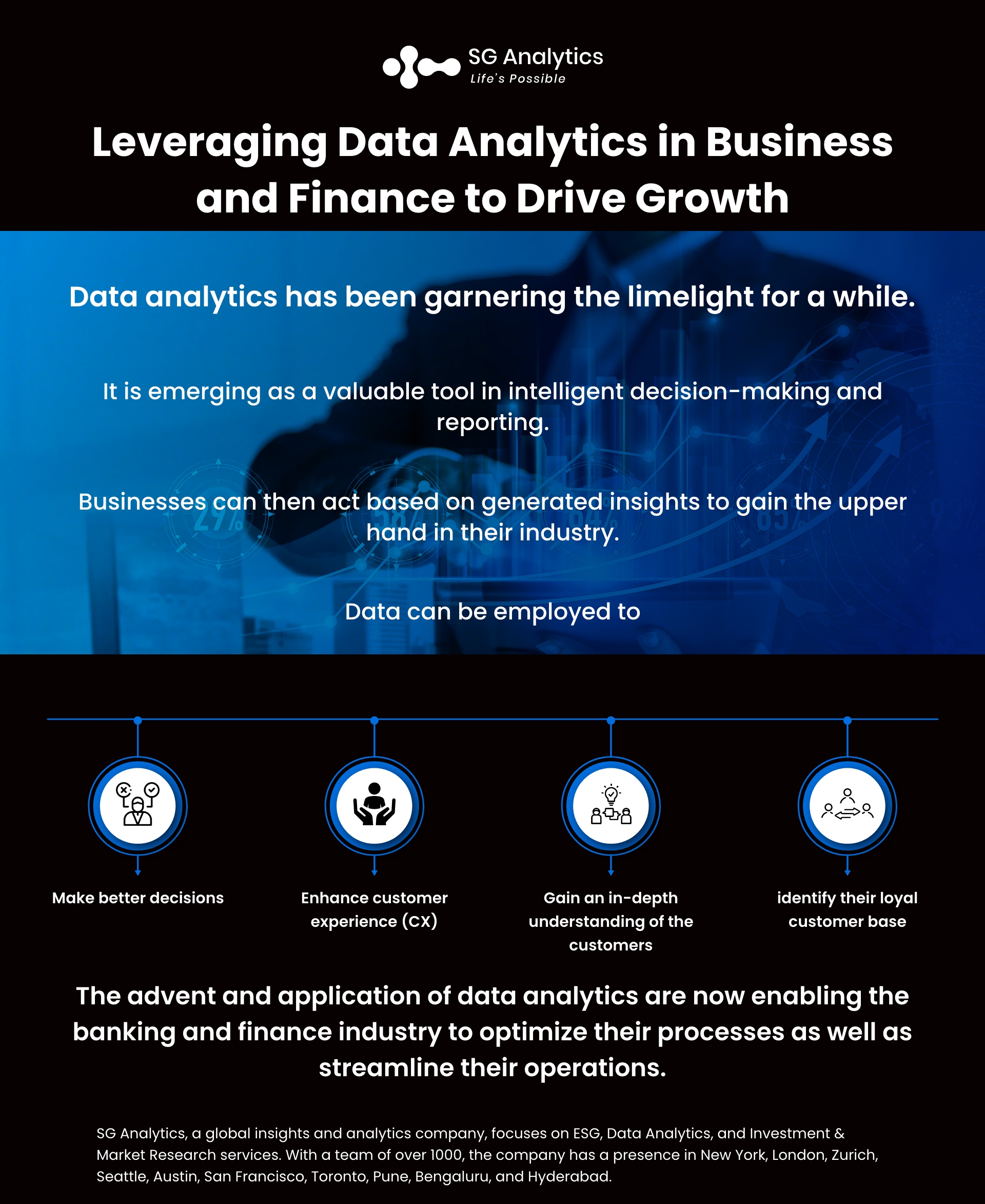How Data Analytics Helps in Business and Finance Sector to Drive Growth
A significant trend, data analytics, has been garnering the limelight for a while. It is emerging as an important tool in intelligent decision-making and reporting. Organizations are employing data analytics to discover new insights and make better decisions, as well as to gain a competitive advantage. Businesses are implementing new operations in their journey of data analytics in finance. They are employing the assembled data by using big data technologies to enhance their performance metrics across different departments like sales, finance, customer service, marketing, etc.
Finding the Needle in the Data Haystack
One of the most vital aspects of data analytics implementation is recognizing valuable insights from data. With so much information to filter through, it is important for businesses to appoint a partner that can help them find the needle in the data haystack.
But implementing data analytics is no easy task. Data analysts should be highly skilled and trained to succeed at their job effectively. While this may seem like an obvious requirement in such an important field, there are many challenges that are likely to arise during implementation. This indicates that businesses need to plan when employing new resources for data analysis.
Read more: Black Friday 2022: Will Inflation Impact Holiday Shopping for Consumers?

Assembling the Gold Mine of Data
The raw material of data analytics is data that can be assembled from many different sources. Data can be collected from multiple sources like websites, social media, mobile apps, or even other databases.
Data can be stored in many forms, structured or unstructured. The accumulated data can then be analyzed to understand the existing as well as upcoming marketing trends and patterns. For example, your online bank can calculate how much money is spent every month on groceries depending on previous transactions.
Creating Value from the Accumulated Data
Data is a source of competitive advantage for almost all businesses. However, the ability lies in turning the collected data into meaningful insights. Businesses can then act based on the generated insights to gain the upper hand in their industry. This makes employing a data analytics firm an attractive option for businesses to study existing market patterns and customers.
Data can be employed to make better decisions. The right insights will enable businesses to make smarter business decisions, thereby driving growth or improving efficiency by understanding consumer behavior, employee engagement, operational productivity, supplier relationships, and risk management.

Data can be used to enhance customer experience (CX). Gaining an in-depth understanding of the customers before they become customers enables businesses to offer relevant services at all stages in their journey with your brand. This can range from pre-purchase to life cycle management and post-purchase. This will enable businesses to have identified their loyal customers over time rather than churning them out on the competition's doorstep.
The most valuable asset of any company, data is the key to the future, and it is also fueling the contemporary trends of digital transformation.
Read more: 7 Trends That BFSI Industry Cannot Ignore Anymore- Get Ready for 2023
Data Implementation Journey in Business and Finance
The journey of data analytics implementation begins with the right data. But the implementation journey is deemed the most challenging stage, as businesses must have a lot of support to manage their data and make it valuable. The next step is to make the right decision based on the derived analysis. Data analytics not only helps companies to make more informed decisions; it also assists in safeguarding their investments by facilitating better risk management strategies for both internal and external stakeholders. Through strategic planning, implementation, and execution, companies can gain a competitive advantage.

Data Analytics: How is it Revolutionizing the Finance Sector
Today, data analytics is revolutionizing the finance sector and other businesses. One way to effectively integrate as well as accomplish the required outcome is by lowering the component of human error in everyday financial transactions.
How is data analytics in finance transforming the finance sector?
Data analytics helps finance executives turn structured as well as unstructured data into insights to promote better decision-making.
Data analytics assists finance teams in gathering required data to understand the key performance indicators (KPIs).
Data analytics also assists finance teams in scrutinizing vital metrics and detecting fraud in revenue turnover. This is beneficial as financial services are experiencing a huge rise in digital fraud activity.
Big data has also helped in improving how stock markets function and upgrading investment-related decision-making.

Significance of Data Analytics in Finance
Is data analytics valuable for finance? The answer is yes.
Data analysis is considered a vital part of finance at this point. Today, no financial organizations are in the state to afford to lose out on data analysis. And the coronavirus pandemic created tremendous uncertainty in the finance sector.
Read more: Trends in Big Data Analytics: Forecast for 2023
The lighthouse in this uncertain situation is the ability to employ advanced data analytics to manage financials better. When an organization can masterfully forecast cash flow and execute its strategic financial visions, it can serve its market and clients for decades to come.
Implementing a financial strategy starts with identifying a company's true financial position. It entails the ability to respond to queries using operational and financial data. And this is where financial data analytics professional comes into the picture. This is the reason data analysis is emerging as a crucial element for the success of financial institutions.

Key Highlights
Organizations implementing leading-edge analytic techniques and technologies can report improvement in their performance uniformly.
For most organizations, the implementation of leading-edge analytics is still a work in progress. Very few organizations are implementing desired leading-edge analytic techniques and technologies.
Strategy formulation and implementation are the potential key areas where analytics has the potential to deliver substantial benefits.
However, adopting leading-edge analytic technologies is especially difficult for mid-market firms.
Future of Data Analytics in the Finance Industry
The future of data analytics in the finance sector and its everyday operations will be secure, as data analysis is vital to the success of financial institutions. With the finance sector continuing to digitize, more and more raw data is getting accumulated for organizational leaders to interpret. And data analytics assists them in making the right use of the assembled data.
Today, only 0.5% of businesses make use of their data, as per a study conducted by Data and Analytics in Financial Services. Financial institutions that practice financial data analysis are helping organizations make the most of their collected data.
Read more: How Fintech Companies are Revolutionizing B2B Payments

Final Thoughts
Data analytics is now recognized as the key component for successfully running any financial institution. It assists in consolidating all the accumulated data and reports into small data sets. Once all the data is accumulated in one data set, it can easily be used to draw conclusions. However, the question is not about why businesses should utilize data analytics but about how to navigate the available data options and then choose the option that is right for their business.
The first vital step is to start building a data-driven organization to keep up with the rising customer demands. With data analytics becoming the big buzzword over the past decade, many organizations are incorporating some of its data forms into their everyday operations. And banks and financial institutions are no exception. The rising interest in integrating data analytics in the banking industry is leading to an increase in changes that have been taking place in this sector. The sector has reported changes in technology, consumer expectations, and market structure and behavior.
The advent and application of data analytics are now enabling the banking and finance industry to optimize their processes as well as streamline their operations. This leads to improving their operational efficiency and competitiveness. Many banks are working to improve their data analytics and gain an advantage against competition or predict the upcoming trends that can affect their businesses.
With a presence in New York, San Francisco, Austin, Seattle, Toronto, London, Zurich, Pune, Bengaluru, and Hyderabad, SG Analytics, a pioneer in Research and Analytics, offers tailor-made services to enterprises worldwide.
A leader in Data Analytics, SG Analytics focuses on leveraging data management & analytics, and data science to help businesses discover new insights and build strategies for business growth. Contact us today if you are looking to make critical data-driven decisions to prompt accelerated growth and breakthrough performance.
Source - https://us.sganalytics.com/blog/data-analytics-in-business-and-finance-to-drive-growth/
Comments
Post a Comment